Surveys and Tutorials in the
Applied Mathematical Sciences
Volume 4
Editors
S.S. Antman, J.E. Marsden, L. Sirovich
�
Surveys and Tutorials in the Applied Mathematical Sciences
Volume 4
Editors
S.S. Antman, J.E. Marsden, L. Sirovich
Mathematics is becoming increasingly interdisciplinary and developing stronger interactions with
fields such as biology, the physical sciences, and engineering. The rapid pace and development of
the research frontiers has raised the need for new kinds of publications: short, up-to-date, readable
tutorials and surveys on topics covering the breadth of the applied mathematical sciences. The
volumes in this series are written in a style accessible to researchers, professionals, and graduate
students in the sciences and engineering. They can serve as introductions to recent and emerging
subject areas and as advanced teaching aids at universities. In particular, this series provides an
outlet for material less formally presented and more anticipatory of needs than finished texts or
monographs, yet of immediate interest because of the novelty of their treatments of applications,
or of the mathematics being developed in the context of exciting applications. The series will often
serve as an intermediate stage of publication of materials which, through exposure here, will be
further developed and refined to appear later in one of Springer’s more formal series in applied
mathematics.
�
Yalchin Efendiev • Thomas Y. Hou
Multiscale Finite Element
Methods
Theory and Applications
123
�
Yalchin Efendiev
Department of Mathematics
Texas A & M University
College Station, TX 77843
USA
efendiev@math.tamu.edu
Editors:
S.S. Antman
Department of Mathematics
and
Institute for Physical Science
and Technology
University of Maryland
College Park
MD 20742-4015
USA
ssa@math.umd.edu
Thomas Y. Hou
Applied and Computational Mathematics,
217-50
California Institute of Technology
Pasadena, CA 91125
USA
hou@acm.caltech.edu
J.E. Marsden
Control and Dynamical
System, 107-81
California Institute
of Technology
Pasadena, CA 91125
USA
marsden@cds.caltech.edu
L. Sirovich
Laboratory of Applied
Mathematics
Department of
Bio-Mathematical Sciences
Mount Sinai School of Medicine
New York, NY 10029-6574
USA
Lawrence.Sirovich@mssm.edu
ISBN 978-0-387-09495-3
DOI 10.1007/978-0-387-09496-0
e-ISBN 978-0-387-09496-0
Library of Congress Control Number: 2008943964
Mathematics Subject Classification (2000): 65N99, 76S05, 35B27
c Springer Science+Business Media, LLC 2009
All rights reserved. This work may not be translated or copied in whole or in part without the written
permission of the publisher (Springer Science+Business Media, LLC, 233 Spring Street, New York,
NY 10013, USA), except for brief excerpts in connection with reviews or scholarly analysis. Use in
connection with any form of information storage and retrieval, electronic adaptation, computer software,
or by similar or dissimilar methodology now known or hereafter developed is forbidden.
The use in this publication of trade names, trademarks, service marks, and similar terms, even if they are
not identified as such, is not to be taken as an expression of opinion as to whether or not they are subject
to proprietary rights.
Printed on acid-free paper
springer.com
�
Dedicated to my parents, Rafik and Ziba,
my wife, Denise, and my son, William
Yalchin Efendiev
Dedicated to my parents, Sum-Hing and Sau-Ying,
my wife, Yu-Chung, and my children, George and Anthony
Thomas Y. Hou
�
Preface
The aim of this monograph is to describe the main concepts and recent ad-
vances in multiscale finite element methods. This monograph is intended for
the broader audience including engineers, applied scientists, and for those who
are interested in multiscale simulations. The book is intended for graduate
students in applied mathematics and those interested in multiscale computa-
tions. It combines a practical introduction, numerical results, and analysis of
multiscale finite element methods. Due to the page limitation, the material
has been condensed.
Each chapter of the book starts with an introduction and description of
the proposed methods and motivating examples. Some new techniques are
introduced using formal arguments that are justified later in the last chapter.
Numerical examples demonstrating the significance of the proposed methods
are presented in each chapter following the description of the methods. In
the last chapter, we analyze a few representative cases with the objective of
demonstrating the main error sources and the convergence of the proposed
methods.
A brief outline of the book is as follows. The first chapter gives a general
introduction to multiscale methods and an outline of each chapter. The second
chapter discusses the main idea of the multiscale finite element method and
its extensions. This chapter also gives an overview of multiscale finite element
methods and other related methods. The third chapter discusses the exten-
sion of multiscale finite element methods to nonlinear problems. The fourth
chapter focuses on multiscale methods that use limited global information.
This is motivated by porous media applications where some type of nonlocal
information is needed in upscaling as well as multiscale simulations. The fifth
chapter of the book is devoted to applications of these methods. Finally, in the
last chapter, we present analyses of some representative multiscale methods
from Chapters 2, 3, and 4.
�
VIII
Preface
Acknowledgments
We are grateful to J. E. Aarnes, C. C. Chu, P. Dostert, L. Durlofsky, V.
Ginting, O. Iliev, L. Jiang, S. H. Lee, W. Luo, P. Popov, H. Tchelepi, and
X. H. Wu for many helpful comments, discussions, and collaborations. The
partial support of NSF and DOE is greatly appreciated.
College Station & Pasadena
August 2008
Yalchin Efendiev
Thomas Y. Hou
�
Contents
1
Introduction . . . . . . . . . . . . . . . . . . . . . . . . . . . . . . . . . . . . . . . . . . . . . . .
1
1.1 Challenges and motivation . . . . . . . . . . . . . . . . . . . . . . . . . . . . . . . .
1
1.2 Literature review . . . . . . . . . . . . . . . . . . . . . . . . . . . . . . . . . . . . . . . .
6
1.3 Overview of the content of the book . . . . . . . . . . . . . . . . . . . . . . . 10
2 Multiscale finite element methods for linear problems and
overview . . . . . . . . . . . . . . . . . . . . . . . . . . . . . . . . . . . . . . . . . . . . . . . . . . . 13
2.1 Summary . . . . . . . . . . . . . . . . . . . . . . . . . . . . . . . . . . . . . . . . . . . . . . . 13
2.2 Introduction to multiscale finite element methods . . . . . . . . . . . . 13
2.3 Reducing boundary effects . . . . . . . . . . . . . . . . . . . . . . . . . . . . . . . . 20
2.3.1 Motivation . . . . . . . . . . . . . . . . . . . . . . . . . . . . . . . . . . . . . . . 20
2.3.2 Oversampling technique . . . . . . . . . . . . . . . . . . . . . . . . . . . . 22
2.4 Generalization of MsFEM: A look forward . . . . . . . . . . . . . . . . . . 23
2.5 Brief overview of various global couplings of multiscale basis
functions . . . . . . . . . . . . . . . . . . . . . . . . . . . . . . . . . . . . . . . . . . . . . . . 25
2.5.1 Multiscale finite volume (MsFV) and multiscale finite
volume element method (MsFVEM) . . . . . . . . . . . . . . . . . 25
2.5.2 Mixed multiscale finite element method . . . . . . . . . . . . . . 27
2.6 MsFEM for problems with scale separation . . . . . . . . . . . . . . . . . 31
2.7 Extension of MsFEM to parabolic problems . . . . . . . . . . . . . . . . . 33
2.8 Comparison to other multiscale methods . . . . . . . . . . . . . . . . . . . 34
2.9 Performance and implementation issues . . . . . . . . . . . . . . . . . . . . 38
2.9.1 Cost and performance . . . . . . . . . . . . . . . . . . . . . . . . . . . . . . 39
2.9.2 Convergence and accuracy . . . . . . . . . . . . . . . . . . . . . . . . . . 40
2.9.3 Coarse-grid choice . . . . . . . . . . . . . . . . . . . . . . . . . . . . . . . . . 41
2.10 An application to two-phase flow . . . . . . . . . . . . . . . . . . . . . . . . . 41
2.11 Discussions . . . . . . . . . . . . . . . . . . . . . . . . . . . . . . . . . . . . . . . . . . . . . 45
3 Multiscale finite element methods for nonlinear equations . 47
3.1 MsFEM for nonlinear problems. Introduction . . . . . . . . . . . . . . . 47
3.2 Multiscale finite volume element method (MsFVEM) . . . . . . . . . 52
�
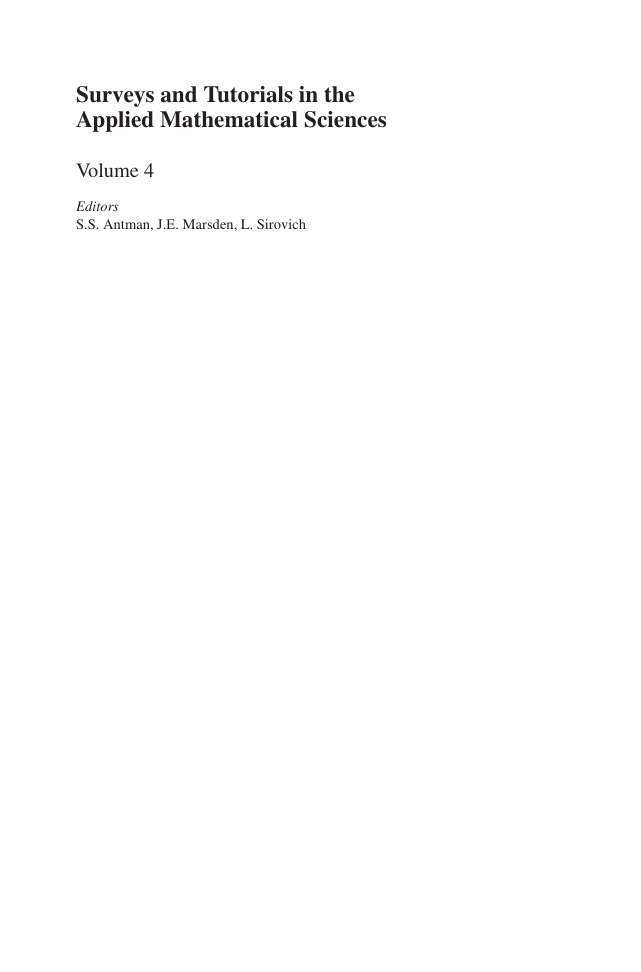

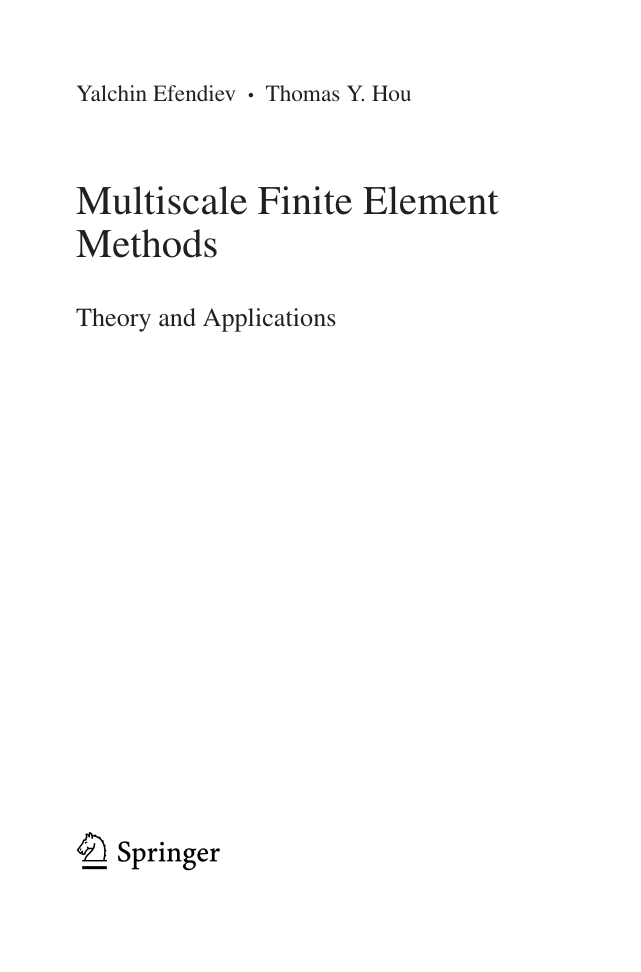
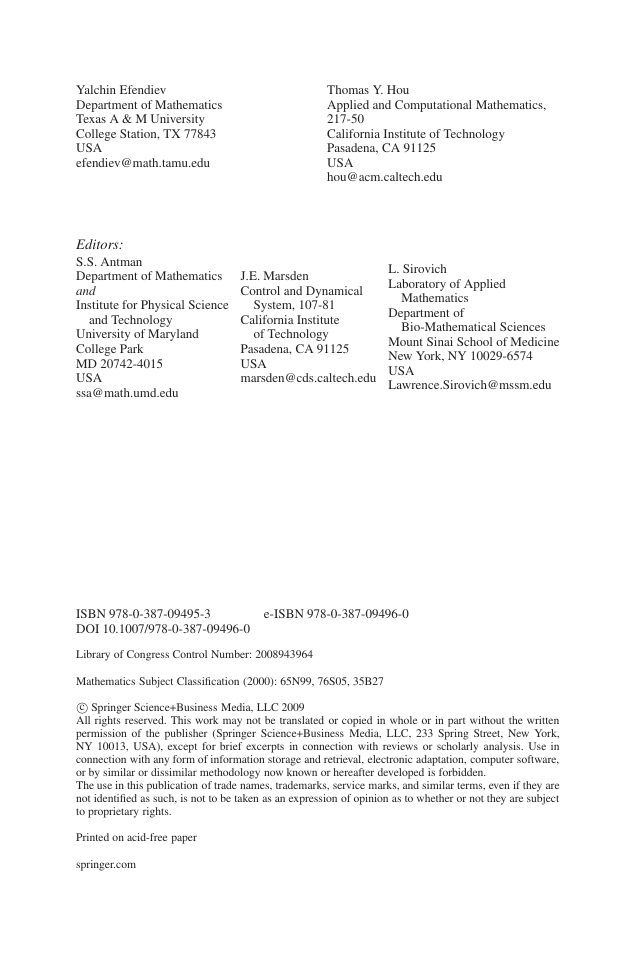

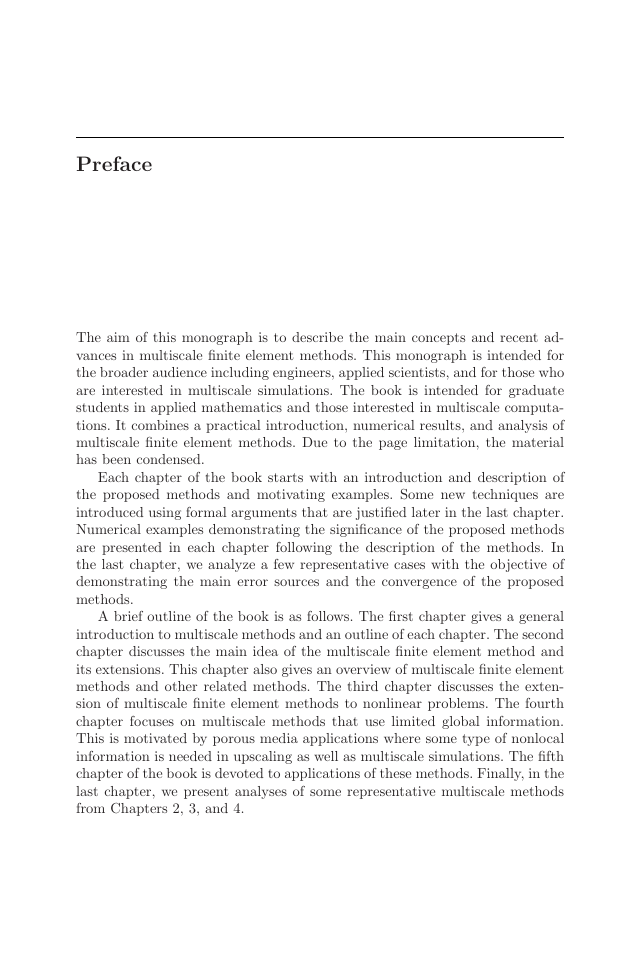
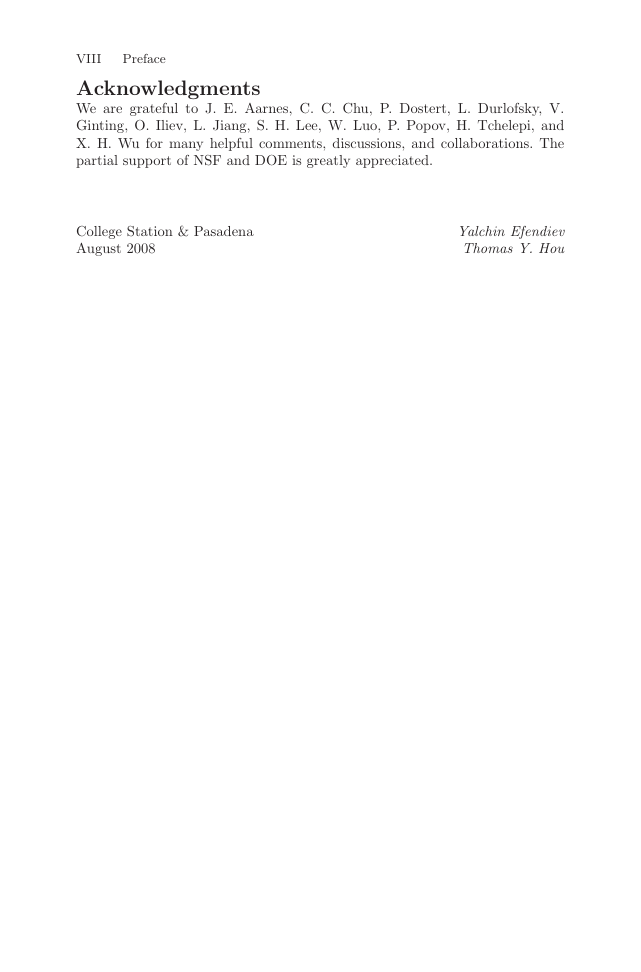
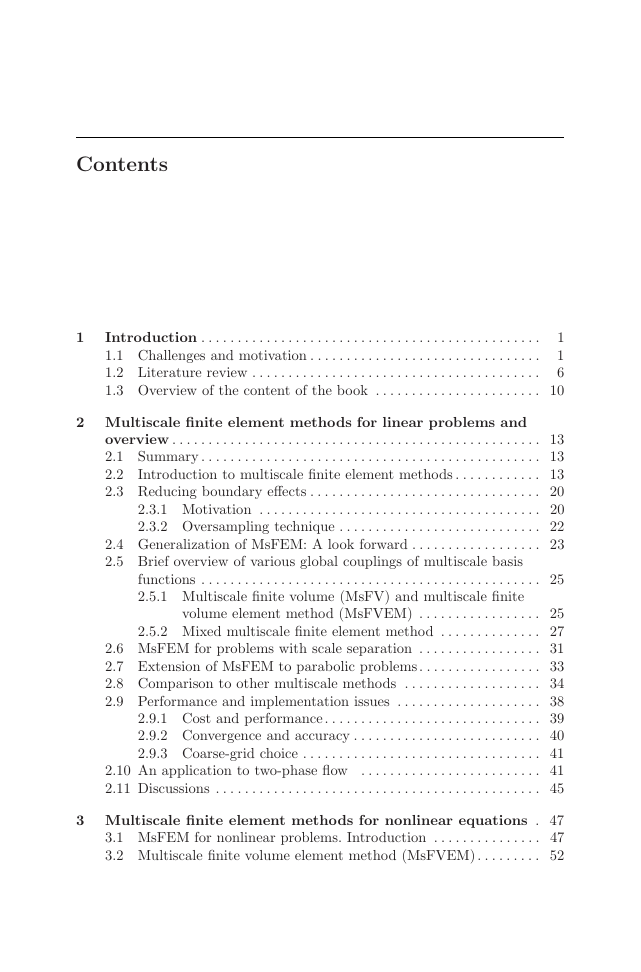








 2023年江西萍乡中考道德与法治真题及答案.doc
2023年江西萍乡中考道德与法治真题及答案.doc 2012年重庆南川中考生物真题及答案.doc
2012年重庆南川中考生物真题及答案.doc 2013年江西师范大学地理学综合及文艺理论基础考研真题.doc
2013年江西师范大学地理学综合及文艺理论基础考研真题.doc 2020年四川甘孜小升初语文真题及答案I卷.doc
2020年四川甘孜小升初语文真题及答案I卷.doc 2020年注册岩土工程师专业基础考试真题及答案.doc
2020年注册岩土工程师专业基础考试真题及答案.doc 2023-2024学年福建省厦门市九年级上学期数学月考试题及答案.doc
2023-2024学年福建省厦门市九年级上学期数学月考试题及答案.doc 2021-2022学年辽宁省沈阳市大东区九年级上学期语文期末试题及答案.doc
2021-2022学年辽宁省沈阳市大东区九年级上学期语文期末试题及答案.doc 2022-2023学年北京东城区初三第一学期物理期末试卷及答案.doc
2022-2023学年北京东城区初三第一学期物理期末试卷及答案.doc 2018上半年江西教师资格初中地理学科知识与教学能力真题及答案.doc
2018上半年江西教师资格初中地理学科知识与教学能力真题及答案.doc 2012年河北国家公务员申论考试真题及答案-省级.doc
2012年河北国家公务员申论考试真题及答案-省级.doc 2020-2021学年江苏省扬州市江都区邵樊片九年级上学期数学第一次质量检测试题及答案.doc
2020-2021学年江苏省扬州市江都区邵樊片九年级上学期数学第一次质量检测试题及答案.doc 2022下半年黑龙江教师资格证中学综合素质真题及答案.doc
2022下半年黑龙江教师资格证中学综合素质真题及答案.doc